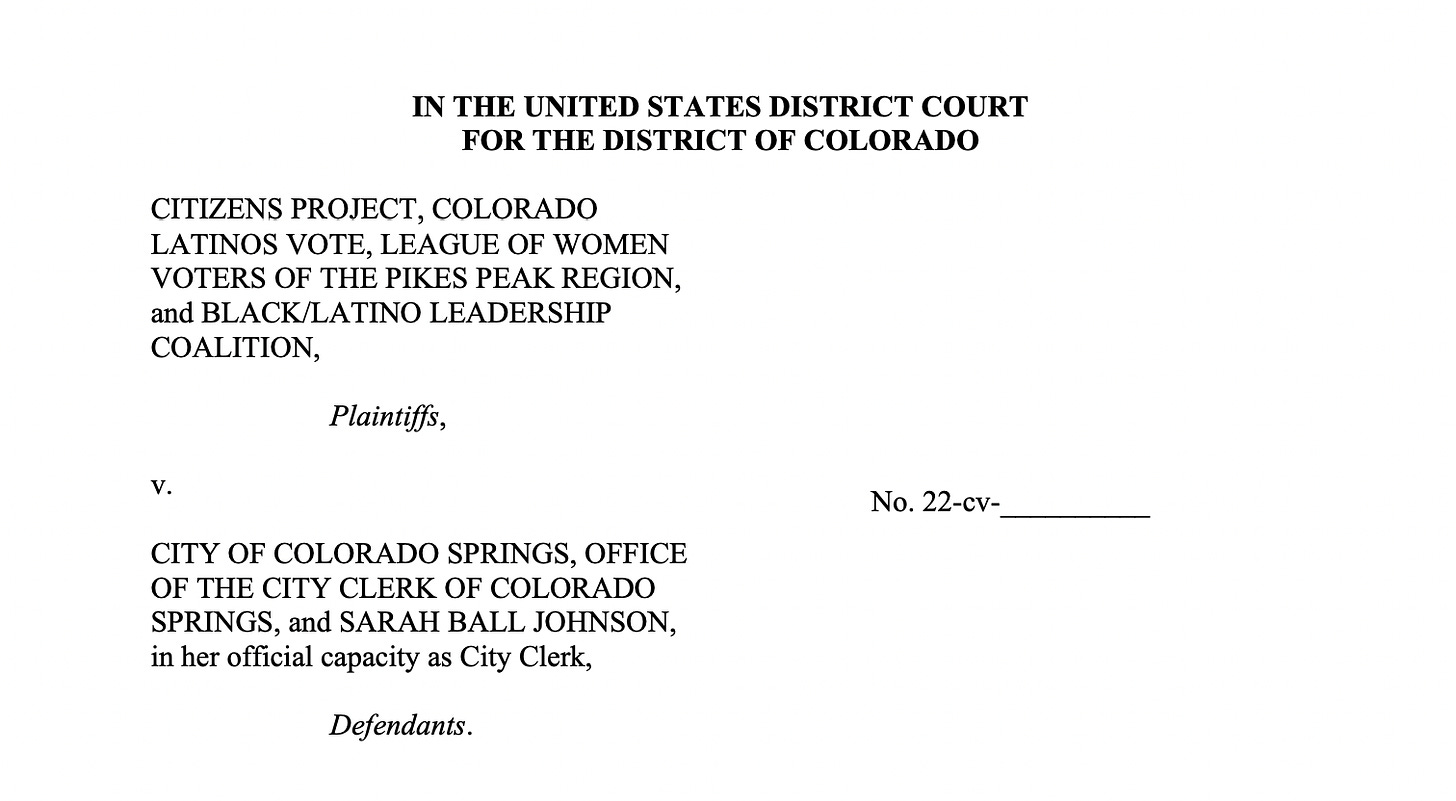Did you know the average local voter turnout nationwide is 15% to 27%? That’s pretty low.
Especially compared to national elections, where average voter turnout is around 60%. Still, that’s low compared to other countries. In a nation that doesn’t require its citizens to vote, getting people to the polls can be tricky business.
Local elections are also “less likely to be representative of the income, age, and ethnicity of the community,” according to the National Civic League. Here are some key statistics about voters that show up in local elections:
High-income earners are 30% to 50% more likely to vote in local elections than low-income earners.
People over 65 are seven times more likely to vote than people aged 18 to 34.
So, who is represented? One only needs to look at who is choosing our legislators.
Here’s how Colorado Springs fares in local elections:
In our last municipal election on April 6, 2021, only 26.87% of registered voters hit the polls.
An average of 16% of non-white registered voters participate in local elections in the Springs, compared to an average of 64% of non-white registered voters in national elections.
White voters participate in local elections at an average rate of 32%.
These stats are why a coalition of civic groups have filed a lawsuit.
The Citizens Project, Colorado Latinos Vote, League of Women Voters of the Pikes Peak Region and the Black/Latino Leadership Coalition are hoping their legal action will move our local elections from spring to fall in hopes to boost turnout.
According to the National Civic League and multiple voter turnout studies, local elections that happen at the same time as national elections have higher voter turnout. So, one way to increase participation in our elections might be to move the date, like the plaintiffs of the lawsuit are currently arguing.
Colorado Springs is only one of three populous cities in the state that hold springtime elections. According to the lawsuit, “of Colorado’s 25 largest municipalities, 20 hold their local elections in November. Only two other municipalities (Fort Collins and Grand Junction) use the same election schedule as Colorado Springs.”
Cities across the country are abandoning springtime elections in red and blue states alike. “Arizona, California, Nevada, and Virginia all recently passed laws moving municipal elections to November,” states the lawsuit.
The plaintiffs of the lawsuit argue that it’s easier and more equitable to knock out elections in one fell swoop in November.
.Here are some factors that make people more likely to vote:
Your partner, family members, or close friends vote. Close proximity to voters makes someone more inclined to vote, according to researchers Rüdiger Schmitt-Beck and Christian Mackenrodt.
A campaign has reached out to you. This is especially effective among young voters, according to researchers Thomas Holbrook and Aaron Weinschenk.
The election is competitive. Dueling well-funded campaigns catch the attention of voters, according to researcher Julianna Pacheco.
The election is well-covered by local news. Access to information about an election increases turnout, according to researchers Meghan Rubado and Jay Jennings.
A city government has a “mayor-council” system. This means that the city elects the mayor separate from the city council, and the mayor has more power. Colorado Springs has one of these. Researchers Robert Alford and Eugene Lee studied this phenomenon back in 1968.
Even if some of these factors don’t apply to you, you can still vote! I wrote an explainer on how to vote last week.
Now, let’s get you up to speed on the election, candidates, or issues facing the city this week
🎤 The City of Colorado Springs, led by Mayor John Suthers who has endorsed Wayne Williams for mayor, released a new 25-minute podcast about the election this week.
🏫 “Voters looking learn more about the candidates for Colorado Springs City Council and mayor running in the city’s April 4 election can avail themselves of several events in the coming weeks,” Sixty35 Media reported.
👀 “WATCH: Colorado Springs city council candidate meet and greet,” KKTV reported.
💰 “A small-business owner poured his own money into the Colorado Springs mayor's race this week to take the lead with the most cash on hand to spend through the critical campaign push ahead of the April election,” The Gazette reported.
💧 Outgoing Mayor John Suthers penned an opinion column in The Gazette this week urging the city to protect its water supply.
⛲️ “Colorado Springs Mayor John Suthers signed a new rule that went into effect Friday that'll hold developers to new water rules,” KRDO reported.
👔 “Travas Deal has been named the fourth CEO of Colorado Springs Utilities, with an annual salary of $480,000 to match his predecessor,” The Gazette reported. “The Colorado Springs Utilities Board, which is also the City Council, voted 8-1 during its regular meeting Wednesday to appoint Deal to the position, with Board Member Bill Murray opposed. The board voted unanimously to approve Deal's employment agreement.”
The CC City Election Reporting Project is a student-faculty collaboration by Colorado College senior Amelia Allen. Colorado College Journalism Institute Co-director Corey Hutchins, is advising the project. This newsletter seeks to provide reporting about the April 4, 2023 city election in a way that is relevant to the campus and broader Springs community.
📬 Enter your email address to subscribe and get the newsletter in your inbox each time it comes out. You can reach me with questions, feedback, or news tips by email at ameliasallen8 [at] gmail [dot] com.




